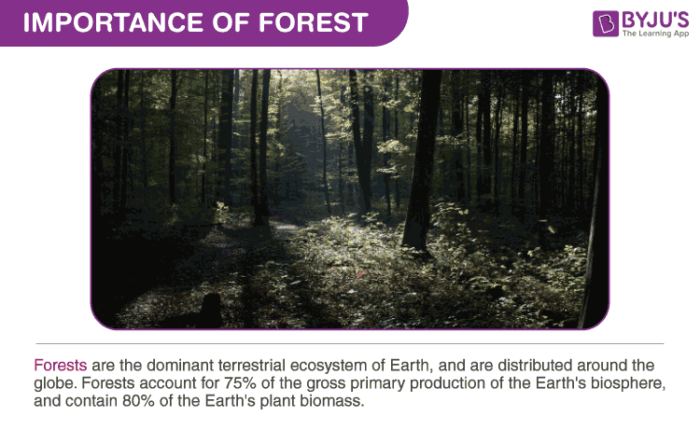Forest: Introduction
Forest is the house of many living organisms. It is a precious resource provided by nature. The organisms living in forests are interdependent on each other. Life in forests is governed by factors like air, water and sunlight. There are a variety of plants available in most forests: herbs, shrubs and trees depending upon the climate of the region. Plants make their own food by the process of photosynthesis and animals depend on plants and other animals for their food. Sometimes plants also depend on animals for processes like pollination and seed dispersal. There are many forests spread over large areas across the globe. Forest can be classified as: tropical, evergreen, partly evergreen, deciduous and dry forests based on the climatic conditions and types of trees present. Forests also comprise non-living components such as lakes, ponds, soil, rocks, etc. A forest is defined as an area forming an ecosystem.
Importance of forest

Forests are of great importance to mankind. Following are some points illustrating the importance of forests:
- Forests help in maintaining the water cycle on earth. Plants absorb water from the soil through their roots. The process of releasing excess water by plants into the atmosphere in the form of water vapour is known as transpiration. The process in which water vapour from oceans rises and condenses to form clouds is known as condensation and the process of moving clouds to land due to sea breeze is known as precipitation and this eventually leads to rainfall. All these processes together form the water cycle and hence forests play a significant role in continuing water cycle.
- Forests help in maintaining the temperature and oxygen level of the atmosphere. Plants release oxygen during photosynthesis and consume carbon dioxide. Forests being a huge reserve of plants and trees, they play a significant role in balancing oxygen level in the atmosphere.
- Forests help in preventing global warming. The increased amount of carbon dioxide (greenhouse gas) in the atmosphere results in the greenhouse effect and thus causes global warming.
- Forests prevent soil erosion. Trees present in the forests hold the soil particles strongly with the roots and prevent them from erosion.
To follow more about the importance of forests, download BYJU’S – The Learning App.

Its good for students